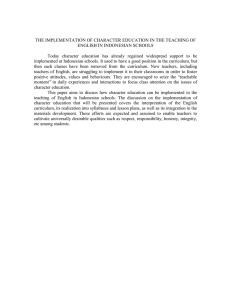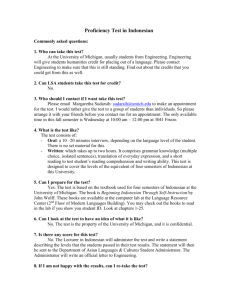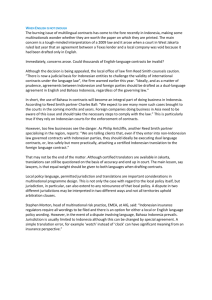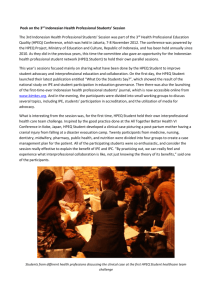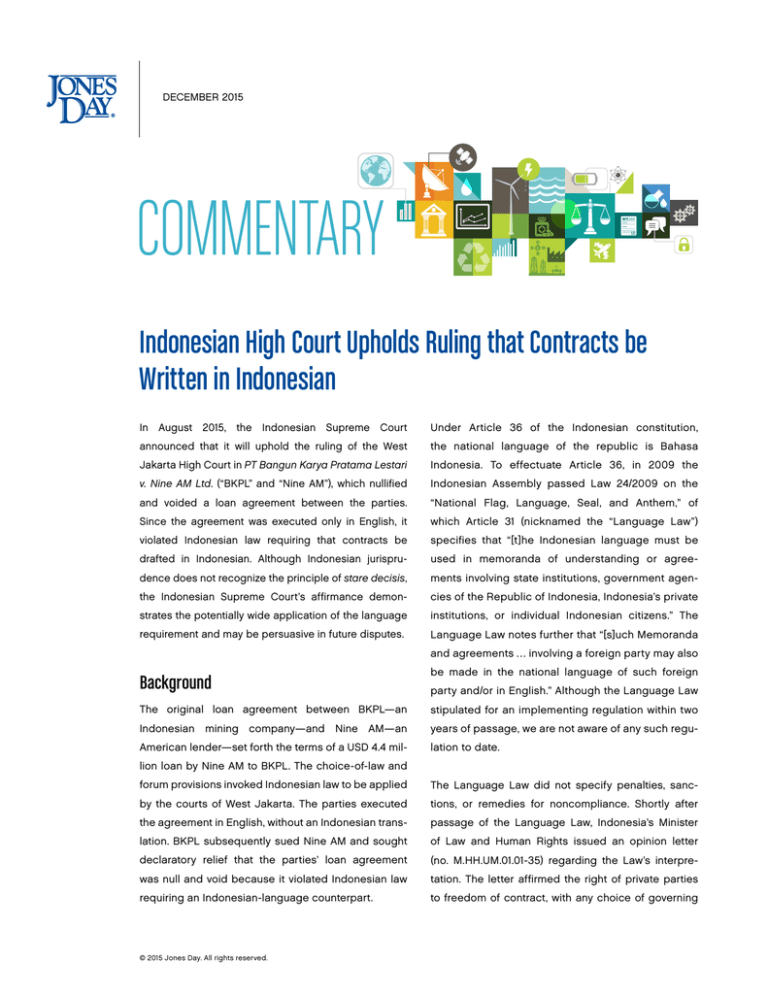
DECEMBER 2015
COMMENTARY
Indonesian High Court Upholds Ruling that Contracts be
Written in Indonesian
In August 2015, the Indonesian Supreme Court
Under Article 36 of the Indonesian constitution,
announced that it will uphold the ruling of the West
the national language of the republic is Bahasa
Jakarta High Court in PT Bangun Karya Pratama Lestari
Indonesia. To effectuate Article 36, in 2009 the
v. Nine AM Ltd. (“BKPL” and “Nine AM”), which nullified
Indonesian Assembly passed Law 24/2009 on the
and voided a loan agreement between the parties.
“National Flag, Language, Seal, and Anthem,” of
Since the agreement was executed only in English, it
which Article 31 (nicknamed the “Language Law”)
violated Indonesian law requiring that contracts be
specifies that “[t]he Indonesian language must be
drafted in Indonesian. Although Indonesian jurispru-
used in memoranda of understanding or agree-
dence does not recognize the principle of stare decisis,
ments involving state institutions, government agen-
the Indonesian Supreme Court’s affirmance demon-
cies of the Republic of Indonesia, Indonesia’s private
strates the potentially wide application of the language
institutions, or individual Indonesian citizens.” The
requirement and may be persuasive in future disputes.
Language Law notes further that “[s]uch Memoranda
and agreements … involving a foreign party may also
Background
be made in the national language of such foreign
party and/or in English.” Although the Language Law
The original loan agreement between BKPL—an
stipulated for an implementing regulation within two
Indonesian mining company—and Nine AM—an
years of passage, we are not aware of any such regu-
American lender—set forth the terms of a USD 4.4 mil-
lation to date.
lion loan by Nine AM to BKPL. The choice-of-law and
forum provisions invoked Indonesian law to be applied
The Language Law did not specify penalties, sanc-
by the courts of West Jakarta. The parties executed
tions, or remedies for noncompliance. Shortly after
the agreement in English, without an Indonesian trans-
passage of the Language Law, Indonesia’s Minister
lation. BKPL subsequently sued Nine AM and sought
of Law and Human Rights issued an opinion letter
declaratory relief that the parties’ loan agreement
(no. M.HH.UM.01.01-35) regarding the Law’s interpre-
was null and void because it violated Indonesian law
tation. The letter affirmed the right of private parties
requiring an Indonesian-language counterpart.
to freedom of contract, with any choice of governing
© 2015 Jones Day. All rights reserved.
language at their discretion. It explained that English-only
valid contracts. It pointed to Article 1320, which, along with
agreements between private parties did not violate the
requirements such as consent and capacity, mandates that
Language Law, and that the absence of an Indonesian coun-
a contract have a “legal cause,” and to Articles 1335 and 1337,
terpart would not affect a contract’s validity.
which define and nullify agreements with a “false or forbidden reason.” Violation of the Language Law, the district court
held, triggers each of these obligations.
Decisions of the Indonesian Supreme Court,
West Jakarta High Court, and West Jakarta
District Court
Significance
On August 31, 2015, the Supreme Court of Indonesia affirmed
The High Court affirmance and the lower court decisions
the May 7, 2014 decision of the High Court of West Jakarta (No.
demonstrate the potential reach of the Language Law. The
48/PDT/20/2014/PT.DKI). With this affirmance, the Supreme
language requirement is one of “lawful cause” going to the
Court rejected Nine AM’s appeal to recognize the validity of
substance and legality of an agreement and not merely one
its loan agreement with BKPL. Although the Supreme Court
of form. Failure by parties to execute an Indonesian-language
has not yet issued a written opinion for its decision, affir-
counterpart provides grounds for nullification, notwithstand-
mances by the Indonesian Supreme Court typically adopt the
ing the contrary opinion letter by an Indonesian Ministry,
reasoning of the intermediate court without further elabora-
the lack of enacting regulation, and the lack of statutorily
tion. The High Court of West Jakarta in turn adopted the June
imposed sanctions for noncompliance.
20, 2013 opinion of the District Court of West Jakarta (No. 451/
Pdt.G/2012.PN.Jkt.Bar), which found the parties’ loan agree-
Given the breadth of the courts’ interpretation and its practi-
ment null and void.
cal implications, practitioners should exercise extreme caution when contracting with Indonesian counterparties: Parties
The district court strictly interpreted the Language Law and
should execute agreements with an Indonesian translation,
noted its command that the “Indonesian language must be
even if time- and cost-intensive. Since the Language Law is
used.” Although Nine AM offered the interpretive guidance of
silent on the choice of governing language, in an attempt to
the Minister of Law and Human Rights, the court rejected this
avoid problems arising from competing interpretations, par-
argument. Under Indonesian law, the court said, legislation is
ties should specify which version will control.
superior to the government’s nonbinding interpretation, so it
Finally, even if the parties fully expect to settle contractual dis-
refused to rely on the Ministry’s opinion letter.
putes by way of arbitration outside of Indonesia, any resulting
Finding a violation of the Language Law, the district court
award may require execution in Indonesia and, accordingly,
also rejected Nine AM’s argument that the Law proscribed
may be vulnerable to collateral attack. Thus, provisions for
no sanctions for noncompliance. The court turned to provi-
resolving disputes outside of Indonesia will not necessarily
sions of the Indonesian Civil Code setting forth elements for
inoculate parties against the language requirements.
2
Jones Day Commentary
Lawyer Contacts
For further information, please contact your principal Firm
representative or one of the lawyers listed below. General
email messages may be sent using our “Contact Us” form,
which can be found at www.jonesday.com/contactus/.
Matthew J. Skinner
Singapore
+65.6233.5502
mskinner@jonesday.com
John Rainbird
Singapore
+65.6233.5512
jrainbird@jonesday.com
Quan Trinh
Singapore
+65.6233.5960
qtrinh@jonesday.com
Jones Day publications should not be construed as legal advice on any specific facts or circumstances. The contents are intended for general information purposes only and may not be quoted or referred to in any other publication or proceeding without the prior written consent of the Firm, to be
given or withheld at our discretion. To request reprint permission for any of our publications, please use our “Contact Us” form, which can be found
on our website at www.jonesday.com. The mailing of this publication is not intended to create, and receipt of it does not constitute, an attorney-client
relationship. The views set forth herein are the personal views of the authors and do not necessarily reflect those of the Firm.

